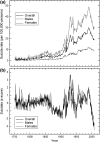Temperature-associated suicide mortality: contrasting roles of climatic warming and the suicide prevention program in Finland
- PMID: 23382022
- PMCID: PMC3773099
- DOI: 10.1007/s12199-013-0329-7
Temperature-associated suicide mortality: contrasting roles of climatic warming and the suicide prevention program in Finland
Abstract
Objectives: Suicide is a notable cause of death worldwide, and while suicidal behavior appears to be associated with variations in temperature, no estimations are available of climate change impacts on suicide rates. The study aims to evaluate the influence of temperature on suicide mortality, especially on multi-decadal and longer time scales, that is, at scales on which the ongoing warming distinctly operates and is correspondingly appropriate for the current policy responses to warming climate.
Methods: Our results are based on an extraordinarily long record of deaths from suicide in Finland from 1751 to 2008, and a similarly long climatic record of ambient temperatures correlative of environmental change in the study region.
Results: We show that temperature variability explains more than 60 % of the total suicide variance up until the initiation of a national suicide prevention program. Despite ongoing warming, suicide rates have declined since the initiation of the program.
Conclusion: By understanding the complexity of suicidal behavior as a response to ambient warming and the observed effects of interventions, our results underline the pressing need for a network of prevention programs to battle against temperature-mediated health hazards.
Figures




References
-
- Intergovernmental Panel on Climate Change (IPCC), Climate change 2007: the physical science basis. Contribution of Working Group I to the fourth assessment report of the Intergovernmental Panel on Climate Change. Cambridge: Cambridge University Press; 2007.
Publication types
MeSH terms
LinkOut - more resources
Full Text Sources
Other Literature Sources
Medical
